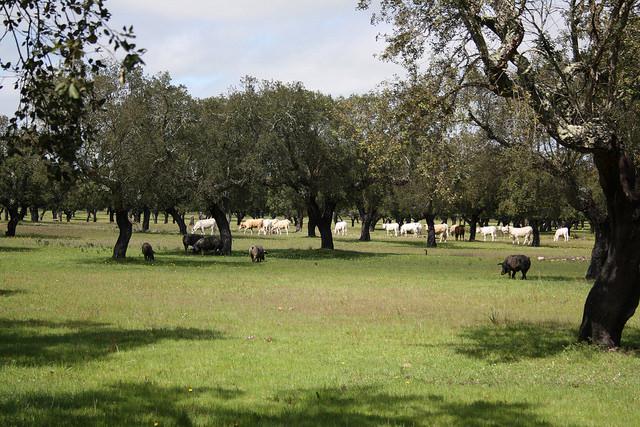
Montado e sistemi di mosaico, Portogallo
Descrizione del sistema
Il Montado rappresenta il principale sistema agroforestale tradizionale del Portogallo ed è caratterizzato da una bassa densità arborea associata con attività agricola o pastorale. Le principali specie arboree del sistema sono la sughera (Quercus suber L.) ed il leccio (Quercus ilex subsp. Rotundifolia L.) che, secondo i dati dell’Inventario Forestale Nazionale (2010), occupano rispettivamente una superficie di 736,775 ha e 331,179 ha. La maggior parte dell’area a Montado si rinviene nella parte sud-orientale del Portogallo.
Agroforestry also exists in North and Central Portugal in the form of natural pastures where trees are included as hedges, borders or riparian forest lines (collectively known as "Lameiros"), and there are considered to be about 41400 ha of low density stands of sweet chestnut (Castanea sativa) called "Soutos e castinçais".
Per maggiori informazioni sulle attività di ricerca che riguardano questo sistema agroforestale, contattare Dr Joana Amaral Paulo (joanaap@isa.ulisboa.pt) o Dr João Palma (joaopalma@isa.ulisboa.pt), presso Instituto Superior de Agronomia (ISA), Universidade de Lisboa, Portugal.
Meeting iniziale con gli stakeholders
Il primo meeting con gli stakeholders è stato organizzato il 24 luglio 2014 presso il City Council of Coruche ed ha visto la partecipazione di 22 persone tra tecnici ed imprenditori agricoli e forestali. Secondo gli stakeholders che hanno partecipato, la possibilità di ottenere prodotti e redditi diversificati, la conservazione del suolo e della biodiversità e degli habitat naturali nonché la riduzione del rischio di incendio sono i principali aspetti positivi del Montado. Viceversa, tra quelli negativi, i partecipanti al meeting hanno menzionato la complessità della gestione del sistema, la limitata capacità rigenerativa e di sopravvivenza delle specie arboree e la complessità dei regolamenti comunitari. I partecipanti hanno individuato nella valutazione economica di questi sistemi il principale aspetto di ricerca da indagare.
An initial meeting was also held with stakeholders on 28 October 2014 focused on the mosaic agroforestry systems found in Northern and Central Portugal.
Download the initial stakeholder report
Two initial stakeholder reports were produced: one focused on the montado system and one on traditional agroforestry systems in Northern and Central Portugal.
Download the initial research and development protocol
A protocol on cork oak systems was produced in February 2015.
Download the system description
A system description report providing an update on the research on cork oak silvopastoral systems was produced in January 2016.
Lessons learnt
Staff from the University of Lisbon have produced a report to summarise their research on the effects of understory management on tree and cork growth in the montados of Portugal.
- A medium-term trial (over 10 years from 2003 to 2012) showed small and varying differences in the effect of a lupin pasture (relative to spontaneous vegetation) on the annual growth of cork. However, no effect was observed on tree wood diameter growth.
- The cork thickness variability between trees and the individual tree responses seemed to be more affected by climate conditions than the tested management alternatives. Differences found between two blocks suggest that site characteristics should be explored in further research.
- A short-term and on-going trial (2016 - on going) is comparing the effect on cork growth, soil and leaf properties of incorporating understorey vegetation into the soil and of applying fertilizer. The measurements are ongoing, but initial results suggest that the response of the trees to the treatments are affected by the weather in a particular year and the time from the last cork harvest (cork age).